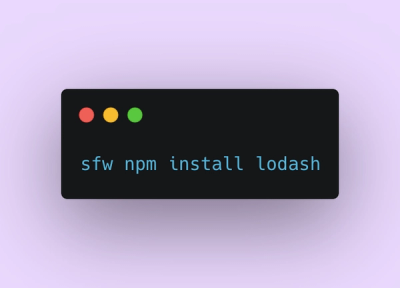
Product
Introducing Socket Firewall: Free, Proactive Protection for Your Software Supply Chain
Socket Firewall is a free tool that blocks malicious packages at install time, giving developers proactive protection against rising supply chain attacks.
find-yarn-workspace-root
Advanced tools
Algorithm for finding the root of a yarn workspace, extracted from yarnpkg.com
The find-yarn-workspace-root npm package is a utility that helps to find the root of a Yarn workspace. It traverses the directory tree up from a given directory until it finds a package.json file with a 'workspaces' field, indicating the root of a Yarn workspace. This is particularly useful in monorepo setups where multiple packages are managed under a single version control system.
Find Yarn Workspace Root
This feature allows you to find the root directory of a Yarn workspace by providing the current directory. It will return the path to the workspace root or null if it's not inside a Yarn workspace.
const findYarnWorkspaceRoot = require('find-yarn-workspace-root');
const workspaceRoot = findYarnWorkspaceRoot(__dirname);The pkg-dir package is similar in that it finds the root directory of a Node.js project or npm package by locating the package.json file. However, it does not specifically look for Yarn workspace roots and is more general-purpose.
find-root is another package that finds the root of a project by searching for a specific file (by default package.json) in the current directory or any parent directory. It's similar to find-yarn-workspace-root but does not specifically target Yarn workspaces.
find-package-json is a package that iterates over the filesystem to find all the package.json files. It can be used to find the nearest package.json file, but unlike find-yarn-workspace-root, it does not provide specific functionality for identifying Yarn workspace roots.
Algorithm for finding the root of a yarn workspace, extracted from yarnpkg.com
yarn add find-yarn-workspace-root
const findWorkspaceRoot = require('find-yarn-workspace-root');
const workspaceRoot = findWorkspaceRoot(__dirname); // Absolute path or null
Contributions are welcome! Just clone this repository and install the dependencies:
git clone https://github.com/square/find-yarn-workspace-root.git
cd find-yarn-workspace-root
yarn
Note that you'll need node and yarn installed. Next, verify the tests all pass:
yarn test
Then create a branch for your bugfix/feature, make changes and update the tests, and submit a pull request. Please do not change the version in package.json when submitting a pull request. We determine the next version automatically based on the commits since the last release.
NOTE: Commit messages follow the Angular commit message guidelines.
To trigger a release, bump the version using standard-version:
To update the CHANGELOG, bump the version in package.json, and create a git tag, run:
$(yarn bin)/standard-version
git push && git push --tags
npm publish
Copyright 2017 Square, Inc.
FAQs
Algorithm for finding the root of a yarn workspace, extracted from yarnpkg.com
The npm package find-yarn-workspace-root receives a total of 2,803,525 weekly downloads. As such, find-yarn-workspace-root popularity was classified as popular.
We found that find-yarn-workspace-root demonstrated a not healthy version release cadence and project activity because the last version was released a year ago. It has 8 open source maintainers collaborating on the project.
Did you know?

Socket for GitHub automatically highlights issues in each pull request and monitors the health of all your open source dependencies. Discover the contents of your packages and block harmful activity before you install or update your dependencies.

Product
Socket Firewall is a free tool that blocks malicious packages at install time, giving developers proactive protection against rising supply chain attacks.

Research
Socket uncovers malicious Rust crates impersonating fast_log to steal Solana and Ethereum wallet keys from source code.

Research
A malicious package uses a QR code as steganography in an innovative technique.